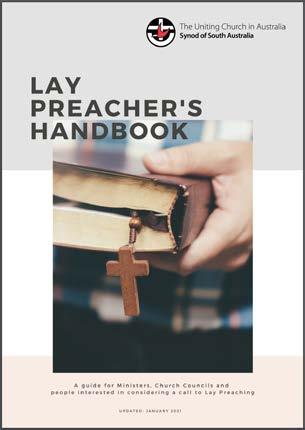
5 minute read
Online safety and family and domestic violence
Rev Philip Gardner Many anxieties assailed us in 2020 and one in particular was the impact of lockdown(s) on domestic and family violence.
People forced to spend time together, restricted movement and increased anger seemed like a powder keg in which the vulnerable were placed in an even more precarious position. Another concern was people’s online safety as many explored the joys of Zoom meetings and generally increased their online presence.
I participated in a filmed national conversation about online safety for congregations late last year. One of the lessons from that conversation is that in many ways the same practices that help us be safe in our ‘normal’ settings protect us in an online space too. Thoughtful preparation, consideration of risks, exploring different perspectives on a given scenario, screening and education of leaders, all help develop an umbrella of safety.
A very helpful website is the e-Safety Commission website: esafety.gov.au. They provide a range of resources for communities and families, including publishing research on e-safety. In December 2020 new research was published entitled ‘Children and Technology - Facilitated Abuse in Domestic and Family Violence Situations.’
This article picks up some of the key concerns of the last year. One of the discoveries in the research is that most abuse occurs using traditional means of communication e.g. the most common means of communication in abuse to spouses or children involves the use of the telephone. One of the key recommendations is that leaders in organisations – and this would clearly include the church – are educated about domestic and family violence.
Some of this is picked up in the Mandatory Reporting training, called ‘Through Their Eyes’ and also the ‘Called to Care’ program. For more information visit: sa.uca.org.au/safechurch.
building better teams
Rev Philip Gardner In November 2020, Rev Mark Schultz led a session on Governance for Mission at the Generate Presbytery hub meeting for Southern Adelaide. I was there with other members of our Church Council and we were given an opportunity to reflect on our culture as a council.
We were positive about the culture of our Church Culture, the way we spoke to one another, the ways we disagreed with one another and the way we maintained the key focus of our meetings. We felt that we had a warm, generous spirit where people were encouraged to voice disagreement in respectful ways and we sought to discern God’s will together.
However a series of questions arose for us. For example: How did the healthy culture arise? How do we ensure its continuation? What process do we have in place for new members? And what are the values and practices that make up that culture?
Having conversations about developing and maintaining the culture of your Church Council or any other committee or team can be rewarding and helpful. Unearthing our expectations of one another, agreeing on behaviour, working through how to raise conflict and resolve it can all help strengthen and deepen the culture of a council or team. There are a number of resources to help you do this and I am sure that your Presbytery leadership would be happy to guide you. Placements and Safe Church would also be glad to assist.
A process might include engaging with Scripture passages where Jesus or Paul discuss expectations of leaders and communities. For example, the Sermon on the Mount (Matthew 5 – 7), Jesus teaching to his disciples on the road to Jerusalem (Mark 8:22-10:52) or passages like Romans 12, Colossians 3-4 and Ephesians 4-5:20 and then think through what might a healthy community look like in your context?
The Manual for Meetings, which is included in the Regulations also has some very insightful things to say about Christian community and how this is embodied in how we meet together. Processes like ‘Six Thinking Hats’ can also be helpful because they invite dissent and disagreement in a structured process.
So an invitation – build consensus on agreed behaviour this year and plan how you will embody Christian community and deepen it as you come together.

building better communities
Rev Philip Gardner The Uniting Church has a number of codes of practice. The best known is the Code of Ethics and Ministry Practice, and there are similar codes for Lay Preachers and for Lay Leaders. Each of them is placed in a thoughtful and helpful theological framework reminding us that Christian community is a gift of God through the life, death and resurrection of Jesus. Furthermore as we worship God, serve the community and relate to one another we may build deep and vulnerable relationships. Protecting this gift from God requires thoughtful responses from leaders – hence the codes of practice.
One particular part of the Code of Ethics and Ministry Practice I want to draw to your attention is the section on bullying (Power 3.6 [c and d]). In particular … bullying is considered repeated unwelcome and unsolicited behaviour towards a person who considers it offensive, intimidating or threatening.’
A disappointing part of our work in Safe Church is talking to leaders, lay and ordained, who have been subjected to repeated and unwelcome behaviour. Long haranguing emails, constant aggressive phone calls, blatant rudeness which they are expected to take on the chin because they are a leader. It is time for many of our communities to think about how they will communicate their expectations for Christian community and invite people to commit to these as followers of Jesus.
For our part we intend to communicate about the resources that are available, continue to develop new ones and think carefully about building better processes to build better community and reduce ‘offensive, intimidating or threatening behavior.’ Not simply a task for one person or committee but for the whole church as we seek to embody in community the liberating news of Jesus.











